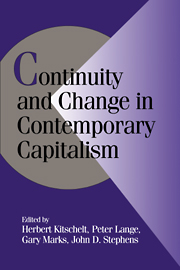Book contents
- Frontmatter
- Contents
- List of Contributors
- Preface
- Introduction
- PART I THE INTERNATIONAL SETTING FOR POLITICAL-ECONOMIC STRATEGIES
- 1 The Global Economy, Post-Fordism, and Trade Policy in Advanced Capitalist States
- 2 The Internationalization of Capital
- 3 The Making of a Polity: The Struggle over European Integration
- PART II THE DYNAMICS OF DOMESTIC POLITICAL ECONOMIES
- PART III POLITICAL ECONOMY AND DEMOCRATIC COMPETITION
- PART IV CONCLUSION
- References
- Index
- Title in the series
1 - The Global Economy, Post-Fordism, and Trade Policy in Advanced Capitalist States
Published online by Cambridge University Press: 05 June 2012
- Frontmatter
- Contents
- List of Contributors
- Preface
- Introduction
- PART I THE INTERNATIONAL SETTING FOR POLITICAL-ECONOMIC STRATEGIES
- 1 The Global Economy, Post-Fordism, and Trade Policy in Advanced Capitalist States
- 2 The Internationalization of Capital
- 3 The Making of a Polity: The Struggle over European Integration
- PART II THE DYNAMICS OF DOMESTIC POLITICAL ECONOMIES
- PART III POLITICAL ECONOMY AND DEMOCRATIC COMPETITION
- PART IV CONCLUSION
- References
- Index
- Title in the series
Summary
By now it is generally agreed that the markets for goods and services of most nations of the world, particularly the advanced capitalist nations, are more closely connected to and affected by the global economy than they ever have been. If openness is measured in the simplest way, by the ratio of imports to gross domestic product, then in general the openness of the advanced capitalist states surpassed that of 1914 during the early 1970s; since then world trade has grown twice as fast as world income, and trade in manufactures three times the rate (McKeown 1991; GATT 1993). For the developed countries, this change is particularly important, because they historically have specialized in the export of manufactured goods. Measured in terms of the value of goods shipped, in 1992 manufactures comprised 73 percent of world trade (GATT 1993: 2). While the collapse of oil prices in the early 1980s partly accounts for this statistic, the succession of post–World War II multilateral tariff reductions that concentrated on lowering tariffs on manufactures also led to greatly increased intraindustry trade among the Organization for Economic Cooperation and Development (OECD) countries (see Table 1.1).
In this chapter I first outline the consequences of changes in the international trading system for the economies of advanced capitalist states, with particular reference to the “post-Fordist” thesis that the industrial structure of these countries is evolving away from the mid-twentieth-century pattern dominated by the employment of large numbers of workers in assembly line production systems driven largely by economies of scale.
- Type
- Chapter
- Information
- Continuity and Change in Contemporary Capitalism , pp. 11 - 35Publisher: Cambridge University PressPrint publication year: 1999
- 12
- Cited by



